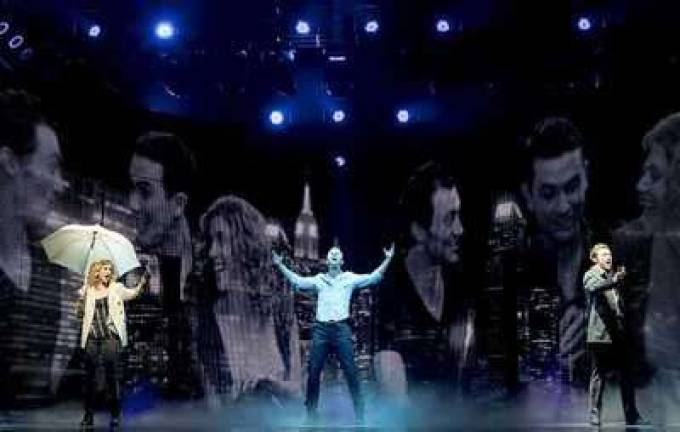Chain This

Ghost the Musical sucks the spirit out of its source material Making a hit movie is an inexact science. If the risk involved weren't so high, the rewards would be less appealing. And there's no easier rubric when it comes to adapting a big stage musical from a hit movie. Successful source material far from guarantees a hit adaptation, and sometimes a tepidly received film can yield a mammoth Main Stem run. I wouldn't expect such a fate for Matthew Warchus' Ghost the Musical, which just opened on Broadway following a West End bow. In fact, this show a perfect example of how what makes a film and what makes a stage work are different, and can't be copied and pasted to replicate a hit from one to the other. Ghost wasn't just a sleeper hit in the summer of 1990; it was an outright miracle, a genre-defying blend of the humor, melodrama, romance, suspense, and the supernatural that out-earned releases starring Kevin Costner, Tom Cruise, Arnold Schwarzenegger, Bruce Willis and ultimately, Home Alone. It sneaked in to get a Best Picture nod back when the Academy still only recognized five nominees (remember that?) and won awards for co-star Whoopi Goldberg and screenwriter Bruce Joel Rubin, and easily helped redefine genre expectations and marketing practices. Rubin's onboard as book writer for the musical, but he's tone deaf as to what onscreen choices will work on the stage, making it clear that Jerry Zucker (best known as part of the Airplane! team) was the one who made the movie special. In order to cavort in the Broadway pop playground, Ghost the Musical is too big to let nuances in, and that's what made the movie an indelible experience for those willing to believe in it. Wall Street banker Sam (Richard Fleeshman) and his sculptor girlfriend Molly (Caissie Levy) have just moved into a new Brooklyn apartment when he's killed in a street mugging. While Molly tries to pick up the pieces with the help of Sam's friend Carl (Bryce Pinkham), Sam's ghost still hovers over the five boroughs, in limbo as he realizes that his assailant is still out to harm Molly. When he encounters feisty fraudulent medium Oda Mae Brown (Da'vine Joy Randolph), her powers suddenly turn out to be real, leading Sam to use her as a conduit to reach Molly, thus endangering her as well. Ghost is more theme park thrill ride than transcendent art. Most of the music, courtesy of Rubin, Dave Stewart (of the Eurythmics!) and Glen Ballard (one of the savviest producers to be found in pop music), feels forgettable and interchangeable. Set designer Rob Howell has assembled a slick series of rotating LED panels that look expensive but often detract from numbers. Additionally, they and John Driscoll's video and projection design add to the show's anachronistic touch: a number about how busy the city is seems plucked straight from the 1980s, as does the dialogue about how groundbreaking it is for Sam and Molly to move to Brooklyn (in the movie, they move into a Tribeca loft). And is it necessary to display a New York City skyline throughout the show? The point of Ghost is that its messages of love and loss speak to anyone, anywhere. Still, Paul Kieve's sleight-of-hand illusions are impressive, however; watching Fleeshman walk through a door is effective. The performances are fine, particularly Pinkham, forced to swim upstream against a two-dimensional role, and Randolph, who both summons Goldberg's spunk from the movie and makes the role her own. But neither plot nor character made Ghost immortal, mood did. The size of the movie was just right. The film's iconic pottery scene (transferred to the show, along with several versions of "Unchained Melody") was one such example. Something as small as a penny pushed against a door could be enough to break hearts and open tear ducts when on celluloid. And it isn't enough on the boards. Zucker's film was more compact, and shows how one genre can achieve what another cannot. A movie can rely on editing, establishing shots, and world-famous movie stars to set tone and along tautly, but stripped of these things onstage, everything takes longer to set up, and the tonal shifts take too long. Randolph's big number, "I'm Outta Here," an eleventh-hour ode to excess, is bombastic fun, but when the applause subsides, Warchus expects his audience to plunge back into Molly's sorrow and the show's central murder mystery. With no grace notes, these transitions are clunky. Also, because it takes so long to introduce Oda Mae into the story, it feels disloyal to give the three more prominent character such short shrift. In Miss Saigon, the Engineer got to sing "The American Dream," not little Tam. Ghost the movie perfectly captured the zeitgeist when it was released; it's a cinematic moment forever frozen in time. But that kind of magic doesn't last forever. Despite a big budget and because of some impressive but soulless effects, all of that melts away here. Ghost the Musical Lunt-Fontanne Theater, 205 West 46th Street, http://www.ghostonbroadway.com/